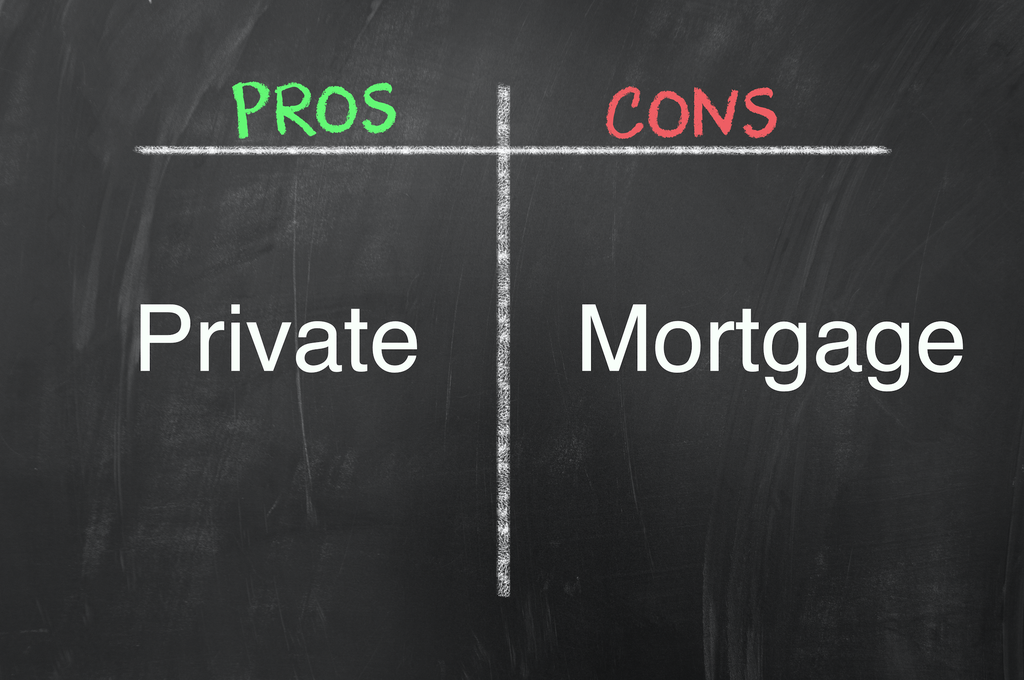The Pros and Cons of Private Mortgage Lenders: A Comprehensive Guide

Did you know that in 2023, private mortgages accounted for nearly 12% of all new mortgage originations in Canada? This surprising statistic highlights the growing importance of private mortgage lenders in our housing market. As the President and Principal Broker of Clover Mortgage, I’ve seen firsthand how private lending has become a crucial option for many Canadians seeking alternative financing solutions.
In this comprehensive guide, we’ll explore the world of private mortgage lenders, discussing their advantages, disadvantages, and everything in between.
Pros of Private Mortgage Lenders
- Easier Qualification Process
- Faster Approval and Funding
- Flexibility in Loan Terms
- Higher Loan-to-Value Ratios
- No Stress Test Requirement
Cons of Private Mortgage Lenders
- Higher Interest Rates
- Additional Fees
- Shorter Loan Terms
- Increased Risk of Foreclosure
- Less Regulatory Oversight
Key Pros and Cons Associated with Private Mortgages
| Aspect | Pros | Cons |
|---|---|---|
| Qualification |
Easier approval process
More flexible income requirements Less emphasis on credit score |
Higher overall cost of borrowing |
| Interest Rates | Maybe the only option for some borrowers | Higher than traditional mortgages |
| Approval Speed |
Fast approval and funding
Quick access to capital |
May encourage hasty decisions |
| Loan Terms |
Flexible and customizable
No stress test required |
Typically shorter-term lengths
It may require refinancing sooner |
| Loan Amount | Potentially higher loan-to-value ratios | Higher risk if the property value decreases |
| Fees | Sometimes lower prepayment penalties |
Higher lender and broker fees
Possible origination fees |
| Use of Funds | Versatile (debt consolidation, renovations, investments) | Higher cost for standard home purchases |
| Regulation | Less stringent regulatory requirements |
Fewer consumer protections
Potential for predatory lending |
| Property Types | Options for non-standard properties | Higher rates for riskier properties |
| Credit Impact | Opportunity to improve credit for future loans | Potential negative impact if payments are missed |
| Exit Strategy | Can be a stepping stone to traditional mortgage | Requires careful planning and execution |
Understanding Private Mortgage Lenders
Private mortgage lenders are individuals or companies that offer loans secured by real estate, operating outside of traditional banking institutions. Unlike banks and credit unions, private lenders have more flexibility in their lending criteria and can often provide solutions for borrowers who may not qualify for conventional mortgages.
Similarly, private student loans are another example of private lending, playing a crucial role in the financial market by bridging funding gaps when federal aid is insufficient, though they lack the borrower protections and benefits of federal loans.
Types of Private Mortgage Lenders
- Individual investors
- Mortgage Investment Corporations (MICs)
- Private lending companies
Each type of lender has its own strengths and focus, catering to different borrower needs and risk profiles.
Pros of Private Mortgage Lenders
Let's start by examining the advantages of working with private mortgage lenders:
1. Easier Qualification Process
One of the most significant benefits of private mortgages is the more lenient qualification process. Private lenders often focus more on the property’s value and potential rather than the borrower’s credit score or income.
“At Clover Mortgage, we’ve helped many clients who were turned down by banks due to unconventional income sources or credit challenges. Private lenders can look beyond these factors and see the bigger picture.” - Rushi Parikh, Mortgage Agent Level 2 .
2. Faster Approval and Funding
Private lenders typically have streamlined processes, allowing for quicker approvals and funding. This can be crucial in time-sensitive situations, such as avoiding foreclosure or seizing investment opportunities.
3. Flexibility in Loan Terms
Private lenders offer more customizable loan terms, including interest-only payments, shorter amortization periods, and more flexible repayment schedules.
4. Higher Loan-to-Value Ratios
Private lenders may be willing to lend a higher percentage of the property's value compared to traditional lenders, which can be beneficial for borrowers with limited down payments or those seeking to maximize their leverage.
5. No Stress Test Requirement
Unlike traditional lenders, private mortgage lenders are not required to apply the federal mortgage stress test, making it easier for some borrowers to qualify for larger loan amounts.
Cons of Private Mortgage Lenders
While private mortgages offer many advantages, it's crucial to consider the potential drawbacks:
1. Higher Interest Rates
The most significant disadvantage of private mortgages is the higher interest rates compared to traditional mortgages. These rates can range from 7% to 15% or more, depending on the borrower’s situation and the property’s risk profile.
2. Additional Fees
Private mortgages often come with additional costs, such as lender fees, broker fees, and legal fees. These can add up quickly and increase the overall cost of borrowing.
3. Shorter Loan Terms
Most private mortgages are short-term solutions, typically ranging from 6 months to 3 years. This means borrowers need to have a clear exit strategy, such as refinancing with a traditional lender or selling the property.
4. Increased Risk of Foreclosure
Due to the higher costs and shorter terms, there’s a greater risk of default and foreclosure with private mortgages. It’s crucial for borrowers to have a solid plan for repayment or refinancing.
5. Less Regulatory Oversight
Private lenders are subject to fewer regulations than traditional financial institutions, which can potentially lead to predatory lending practices if borrowers aren't careful.
Comparing Private Mortgages to Traditional Mortgages
To better understand the differences between private and traditional mortgages, let's look at a comparison table:
| Feature | Private Mortgage | Traditional Mortgage |
|---|---|---|
| Interest Rates | Higher (7-15%+) | Lower (2-5%) |
| Approval Time | Fast (days) | Slower (weeks) |
| Credit Requirements | Flexible | Strict |
| Loan-to-Value Ratio | Up to 85% | Up to 80% (without CMHC insurance) |
| Term Length | Short (6 months - 3 years) | Longer (1-10 years) |
| Fees | Higher | Lower |
| Prepayment Penalties | Often lower or none | Can be significant |
| Stress Test Required | No | Yes |
Who Should Consider a Private Mortgage?
Private mortgages can be an excellent solution for certain types of borrowers:
- Those with a poor credit history
- Self-employed individuals or those with non-traditional income
- Property investors and house flippers
- Borrowers facing time-sensitive financial situations
- Individuals needing debt consolidation
Most private lenders offer a streamlined application process, which can be beneficial for certain borrowers.
Learn more about debt consolidation options
The Application Process for Private Mortgages
Applying for a private mortgage is generally simpler and faster than applying for a traditional mortgage. Here’s a typical process:
- Initial consultation with a mortgage broker
- Property Appraisal
- Review of borrower’s financial situation
- Lender selection and negotiation of terms
- Legal review and documentation
- Funding
It is crucial to understand the monthly payment implications when applying for a private mortgage.
At Clover Mortgage, we guide our clients through each step, ensuring they understand the process and make informed decisions.
Strategies for Success with Private Mortgages
To make the most of a private mortgage, consider these strategies:
- Have a clear exit strategy
- Work on improving your credit score
- Build equity quickly through renovations or market appreciation
- Refinance to a traditional mortgage as soon as possible
- Work with a reputable mortgage broker
“A private mortgage should be viewed as a stepping stone, not a long-term solution. Our goal at Clover Mortgage is to help clients transition to more favourable financing options as their situations improve.” - Steven Tulman
Additionally, understanding the pros and cons of private loans can help borrowers make informed decisions regarding their student financing options.
Legal and Regulatory Considerations
While private lenders have more flexibility, they still operate within a legal framework. Key considerations include:
- Provincial regulations on private lending
- Consumer protection laws
- Mortgage fraud prevention measures
It's crucial to work with a licensed mortgage broker who understands these regulations and can protect your interests.
Private Mortgage Lender Scenarios
Let's look at two scenarios to illustrate how private mortgages can be used effectively:
Case Study 1: Debt Consolidation
John and Mary had accumulated $75,000 in high-interest credit card debt. Despite good incomes, their credit scores had suffered, making it difficult to qualify for a traditional refinance. With our support, we can help John & Mary secure a private second mortgage to consolidate their debts, reducing their monthly payments and putting them on a path to financial recovery. Private student loan lenders might also offer consolidation options, providing another avenue for managing debt effectively.
Case Study 2: Property Investor
Sarah, an experienced property investor, found an undervalued property that needed significant renovations. Traditional lenders were hesitant due to the property's condition. With our support, we can arrange a private mortgage that covers both the purchase price and renovation costs, allowing Sarah to complete the project and refinance with a conventional mortgage once the renovations are complete.
Learn more about renovation loans
Comparing Private Lenders: What to Look For
When choosing a private lender, consider the following factors:
| Factor | Why It's Important |
|---|---|
| Interest Rate | Directly impacts the cost of borrowing |
| Fees | Can significantly affect the total cost of the loan |
| Prepayment Options | Allows for flexibility in repayment |
| Lender Reputation | Indicates reliability and fair practices |
| Loan-to-Value Ratio | Determines how much you can borrow |
| Term Length | Affects your exit strategy planning |
Conclusion: Is a Private Mortgage Right for You?
Private mortgages can be a powerful financial tool when used appropriately. They offer solutions for borrowers who may not fit the traditional lending mold and can provide opportunities for property investment and financial recovery. However, the higher costs and shorter terms require careful consideration and planning.
At Clover Mortgage , we believe in finding the right mortgage solution for each client's unique situation. Whether that's a private mortgage or a conventional loan, our goal is to help you achieve your financial and property ownership goals.
Remember, a private mortgage should typically be viewed as a short-term solution. Always have a clear plan for transitioning to more favourable financing options in the future. With the right strategy and guidance, a private mortgage can be a stepping stone to achieving your long-term financial objectives.
Contact us to learn more about how private mortgages might fit into your financial plan. Our team of experienced brokers is here to guide you through the process and help you make informed decisions about your mortgage options.
Private Mortgage Lenders Frequently Asked Questions
What are the main differences between private loans and traditional mortgages?
Private loans typically have higher interest rates but more flexible eligibility criteria compared to traditional mortgages. They often have shorter terms and faster approval processes, making them suitable for borrowers who may not qualify for conventional loans or need quick financing.
How do credit scores affect private mortgage applications?
While private lenders are generally more lenient with credit scores, your score still impacts the terms of your loan. A higher credit score can lead to better interest rates and loan conditions, even with private lenders.
What are origination fees, and are they common with private mortgages?
Origination fees are upfront charges for processing a new loan. They're more common with private mortgages and can range from 1% to 5% of the loan amount. Always factor these fees into the total cost of borrowing when considering a private mortgage.
Can I use a private mortgage for debt consolidation?
Yes, many borrowers use private mortgages for debt consolidation. This can be an effective strategy to combine high-interest debts into a single, potentially lower-interest payment. However, it’s crucial to have a solid repayment plan to avoid risking your home. Additionally, private student loans can also be consolidated to manage multiple debts more efficiently.
How does income affect eligibility for private mortgages?
Private lenders consider income, but they're often more flexible than traditional lenders. They may take into account non-traditional income sources or focus more on the property's value. However, you'll still need to demonstrate the ability to make monthly payments.
What is a loan servicer, and how do they relate to private mortgages?
A loan servicer manages your loan after it's been issued, handling tasks like collecting payments and managing escrow accounts. With private mortgages, the lender often services the loan directly, but some may use third-party services.
Are there loan forgiveness programs for private mortgages?
Loan forgiveness programs are not typically available for private mortgages. These programs are more common with government-backed loans. Private mortgages are expected to be repaid in full according to the agreed-upon terms.
How do monthly payments differ between private and traditional mortgages?
Monthly payments on private mortgages are often higher due to higher interest rates and shorter loan terms. Some private mortgages may offer interest-only payments for a period, but this can result in a large balloon payment at the end of the term.
Can international students or non-permanent residents get private mortgages in Canada?
Yes, some private lenders offer mortgages to international students and non-permanent residents. These loans often require a larger down payment and may have higher interest rates due to the perceived increased risk.
What's the difference between fixed and variable interest rates in private mortgages?
Fixed interest rates remain the same throughout the loan term, providing predictable payments. Variable rates can change based on market conditions. Private mortgages can offer either, but fixed rates are more common due to their shorter terms.
How do private lenders determine loan amounts?
Private lenders primarily base loan amounts on the property's value, often offering higher loan-to-value ratios than traditional lenders. They also consider factors like the borrower's income, credit history, and the intended use of the funds.
Are there prepayment penalties with private mortgages?
Prepayment penalties can vary widely among private lenders. Some may allow prepayment without penalty, while others may charge fees. It's important to discuss prepayment terms before signing any agreement.





